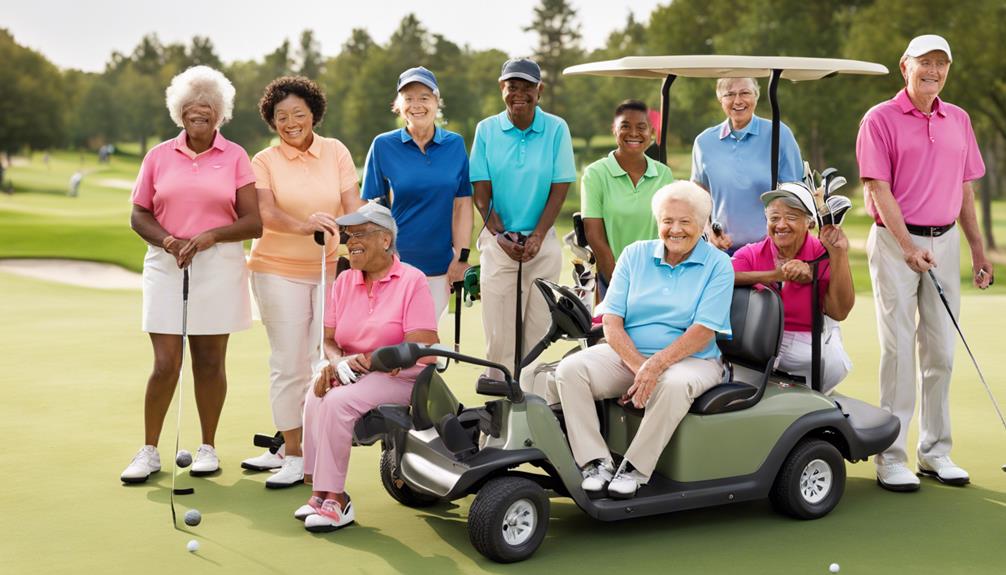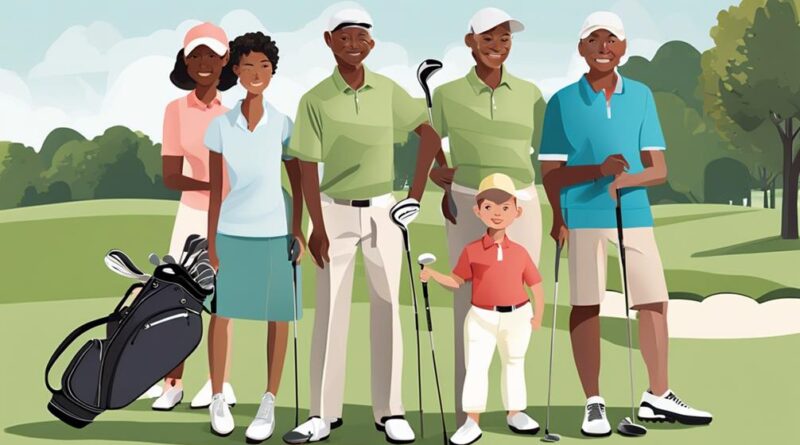What Makes Golf Clubs More Inclusive Today?
Golf clubs today embrace inclusivity with adaptive equipment, diverse memberships, and accessible courses. Tailored programs cater to players of all abilities, promoting a sense of belonging. Inclusive events and gender-neutral facilities create welcoming environments. Staff training ensures understanding and fosters positive interactions. Tailored junior and senior programs focus on skill development for different age groups, fostering community connections. Community outreach initiatives extend beyond club boundaries, reaching diverse populations. These elements work together to create a more inclusive golfing experience for everyone involved.
Adaptive Golf Equipment
Adaptive golf equipment is becoming increasingly essential for golfers with disabilities, enhancing their ability to fully participate in the sport. With customized fittings and innovative technology, golf clubs are now able to cater to a more diverse range of players, ensuring that individuals with physical limitations can enjoy the game to its fullest extent.
Customized fittings play a crucial role in the effectiveness of adaptive golf equipment. By tailoring clubs to suit the specific needs and abilities of each player, individuals with disabilities can experience improved performance and comfort on the course. These customized fittings take into account factors such as height, strength, and range of motion, ensuring that the equipment is optimized for the player's unique requirements.
Innovative technology has also revolutionized the world of adaptive golf equipment. From specialized grips that assist players with limited hand function to lightweight, adjustable clubs that accommodate varying swing speeds, technology continues to push the boundaries of inclusivity in golf. These advancements not only enhance the playing experience for individuals with disabilities but also contribute to breaking down barriers and stereotypes within the sport.
Diverse Membership Programs
Diverse golf clubs today are implementing inclusive membership programs to expand accessibility and participation within the sport. These initiatives aim to create a welcoming environment for individuals from all backgrounds, abilities, and ages. One key aspect of these programs is the introduction of membership discounts, which make joining a golf club more affordable for a broader range of people. By offering reduced rates or flexible payment options, clubs can attract a more diverse membership base and break down financial barriers that may have previously deterred individuals from participating in the sport.
In addition to membership discounts, inclusive tournaments play a significant role in promoting diversity within golf clubs. These tournaments are designed to be welcoming and accommodating to players of varying skill levels, ensuring that everyone feels comfortable participating regardless of their experience on the course. By organizing events that celebrate diversity and inclusion, clubs can foster a sense of community among members and encourage more individuals to engage with the sport.
Accessible Course Design
Enhancing golf course accessibility through thoughtful design considerations benefits a wide range of players, promoting inclusivity and enjoyment for all. Universal design principles play a crucial role in creating golf courses that are inclusive and welcoming to individuals of varying abilities. By implementing features such as wider fairways, strategically placed hazards, and reachable greens, courses can be enjoyed by both experienced golfers and beginners alike.
Inclusive amenities further enhance the accessibility of golf courses. Features like accessible parking spaces, ramps, and paths ensure that players with mobility challenges can navigate the course with ease. Additionally, facilities such as accessible restrooms and seating areas contribute to a more inclusive environment for all golfers. These amenities not only cater to individuals with disabilities but also benefit older players and those recovering from injuries.
Moreover, utilizing universal design principles in the layout of golf courses can lead to a more enjoyable experience for all players. Designing courses with multiple tee box options allows golfers of different skill levels to play together, fostering a sense of inclusivity and camaraderie. Overall, accessible course design plays a significant role in making golf more welcoming and enjoyable for a diverse range of players.
Inclusive Golf Events
When organizing golf events, prioritizing inclusivity fosters a welcoming environment for participants of all backgrounds and abilities. Inclusive tournaments and adaptive clinics play a crucial role in promoting diversity and ensuring that golf events are accessible to everyone. These events cater to individuals with varying skill levels and physical capabilities, creating a more inclusive atmosphere within the golfing community.
Diversity initiatives are essential for promoting inclusivity in golf events. By actively seeking to include individuals from different backgrounds, including minorities and underrepresented groups, organizers can help break down barriers and make golf more accessible to a wider range of participants. Partnering with organizations that specialize in promoting diversity and inclusion can provide valuable insights and resources to make events more welcoming and inclusive.
Moreover, partnership opportunities with adaptive sports organizations can further enhance the inclusivity of golf events. By collaborating with these groups, event organizers can offer adaptive clinics tailored to individuals with disabilities, ensuring that everyone has the opportunity to participate and enjoy the game of golf. These partnerships not only promote inclusivity but also foster a sense of community and support among participants.
Sensitivity Training for Staff
Is there a need for sensitivity training for staff at golf clubs to ensure inclusivity and understanding among all participants and guests? Absolutely. Golf clubs are social hubs where people from diverse backgrounds come together to enjoy the sport, making cultural awareness and effective communication skills essential for creating an inclusive environment.
Here's why sensitivity training for staff is crucial:
- Cultural Awareness: Understanding and respecting different cultural norms, traditions, and beliefs is vital in ensuring that all individuals feel welcome and valued at the golf club. Sensitivity training can help staff recognize and appreciate cultural differences, thereby fostering a more inclusive and harmonious atmosphere.
- Communication Skills: Effective communication is key to providing excellent customer service and building positive relationships with guests. Sensitivity training can enhance staff members' ability to communicate respectfully and attentively with individuals from various backgrounds, ensuring that everyone feels heard and understood.
- Conflict Resolution: In a social setting like a golf club, conflicts may arise due to misunderstandings or differing perspectives. Sensitivity training equips staff with the skills to address conflicts in a sensitive and impartial manner, de-escalating situations and promoting a peaceful environment for all patrons.
Gender-Neutral Facilities
Understanding the importance of creating an inclusive environment for all individuals, the provision of gender-neutral facilities at golf clubs has become a topic of increasing significance. Inclusive amenities such as gender-neutral bathrooms and changing rooms play a crucial role in ensuring that all members and guests feel comfortable and respected regardless of their gender identity. By offering these facilities, golf clubs demonstrate a commitment to diversity and inclusivity, fostering a welcoming environment for everyone to enjoy the sport.
In addition to gender-neutral facilities, golf clubs are also incorporating diverse programming to further enhance inclusivity. By offering a wide range of events, tournaments, and classes that cater to individuals of different backgrounds, abilities, and ages, clubs are actively striving to make golf more accessible to a broader audience. This approach not only attracts new participants but also enriches the overall golfing experience by promoting a sense of community and togetherness among members.
Junior and Senior Programs

Junior and Senior Programs at golf clubs provide specialized opportunities for younger and older members to enhance their skills and enjoyment of the sport. These programs cater to different age groups, offering tailored experiences that focus on skill development and fostering a welcoming environment for all participants.
- Skill Development: Junior and Senior Programs are designed to cater to the specific needs of younger and older golfers. For juniors, these programs often include coaching sessions that focus on fundamental techniques, rules of the game, and on-course etiquette. Seniors, on the other hand, may benefit from programs that help maintain and improve their skills while considering any physical limitations that come with age.
- Age-Friendly Programs: Golf clubs have recognized the importance of creating age-friendly programs that cater to the unique requirements of juniors and seniors. These initiatives promote inclusivity by providing a platform where individuals from different age groups can come together, share their passion for golf, and support each other's development in a supportive and encouraging environment.
- Community Building: Junior and Senior Programs not only focus on individual skill enhancement but also play a vital role in fostering a sense of community within the golf club. By bringing together members of all ages, these programs create opportunities for mentorship, camaraderie, and a shared love for the game, further enhancing the overall golfing experience for everyone involved.
Community Outreach Initiatives
Building on the foundation of fostering community within golf clubs through Junior and Senior Programs, Community Outreach Initiatives serve as a proactive approach to extending the inclusivity and engagement of the club beyond its membership. Inclusive clinics are a key component of these initiatives, providing opportunities for individuals from diverse backgrounds to learn and enjoy the game of golf. These clinics often focus on welcoming beginners, women, children, and individuals with disabilities, creating a supportive environment where everyone feels included and valued.
Moreover, outreach partnerships play a crucial role in expanding the reach of golf clubs and making the sport more accessible to the broader community. By collaborating with schools, local businesses, nonprofit organizations, and other community groups, golf clubs can introduce new audiences to the game, break down barriers to participation, and promote a culture of inclusivity. These partnerships not only benefit the club by increasing its visibility and membership base but also contribute to the social fabric of the community by fostering connections and shared experiences through golf.
Frequently Asked Questions
How Can Golf Clubs Support Players With Physical Disabilities?
To support players with physical disabilities, golf clubs can provide adaptive equipment like specialized clubs or carts. Inclusive competitions allow players of all abilities to compete on an equal playing field, fostering a more welcoming environment.
Are There Membership Programs Specifically for Minority Groups?
Diversity initiatives in golf clubs have become more prevalent. Many clubs have introduced membership programs tailored to minority groups, encouraging inclusivity.
Community outreach efforts have been key in attracting a more diverse range of members. By actively engaging with different communities, golf clubs are fostering a welcoming environment for all.
These initiatives have helped create a more inclusive atmosphere, reflecting the growing diversity within the sport.
What Features Make a Golf Course More Accessible?
To make a golf course more accessible, it's crucial to have facilities that cater to diverse needs. This includes features like smooth pathways, accessible restrooms, and designated parking spaces.
Additionally, providing adaptive equipment such as specialized golf clubs and carts can enhance the experience for individuals with disabilities. By offering these accommodations, golf clubs can ensure that everyone has the opportunity to enjoy the game regardless of physical limitations.
How Are Inclusive Events Different From Traditional Tournaments?
Inclusive events differ from traditional tournaments by embracing adaptive equipment and promoting diverse participation. These events prioritize accessibility for individuals with different abilities, fostering a welcoming and supportive atmosphere.
Why Is Sensitivity Training Important for Golf Club Staff?
Sensitivity training is vital for golf club staff because it enhances their communication skills and empathy.
Role-playing scenarios during training sessions allow staff to practice handling diverse situations effectively.
By improving their understanding of different perspectives, employees can better address the needs of all members and guests.
This training fosters a welcoming environment, promotes inclusivity, and ensures that everyone feels valued and respected at the golf club.
Conclusion
In conclusion, the golf industry has made significant strides in becoming more inclusive by implementing adaptive equipment, diverse membership programs, accessible course designs, inclusive events, sensitivity training for staff, gender-neutral facilities, junior and senior programs, and community outreach initiatives.
These efforts have helped to break down barriers and create a welcoming environment for individuals of all abilities, backgrounds, and ages to enjoy the game of golf.
The continued focus on inclusivity will only serve to strengthen and grow the sport in the future.
